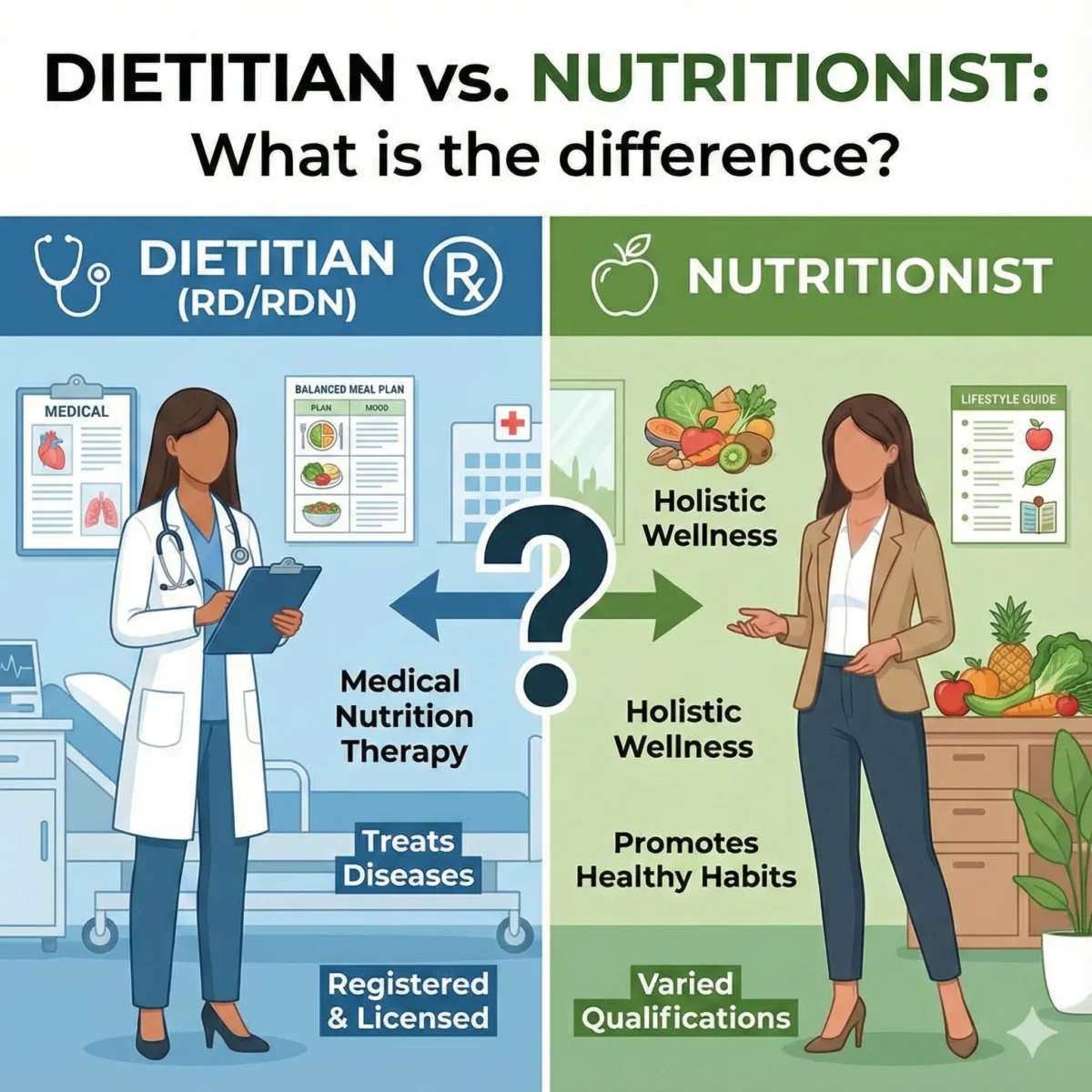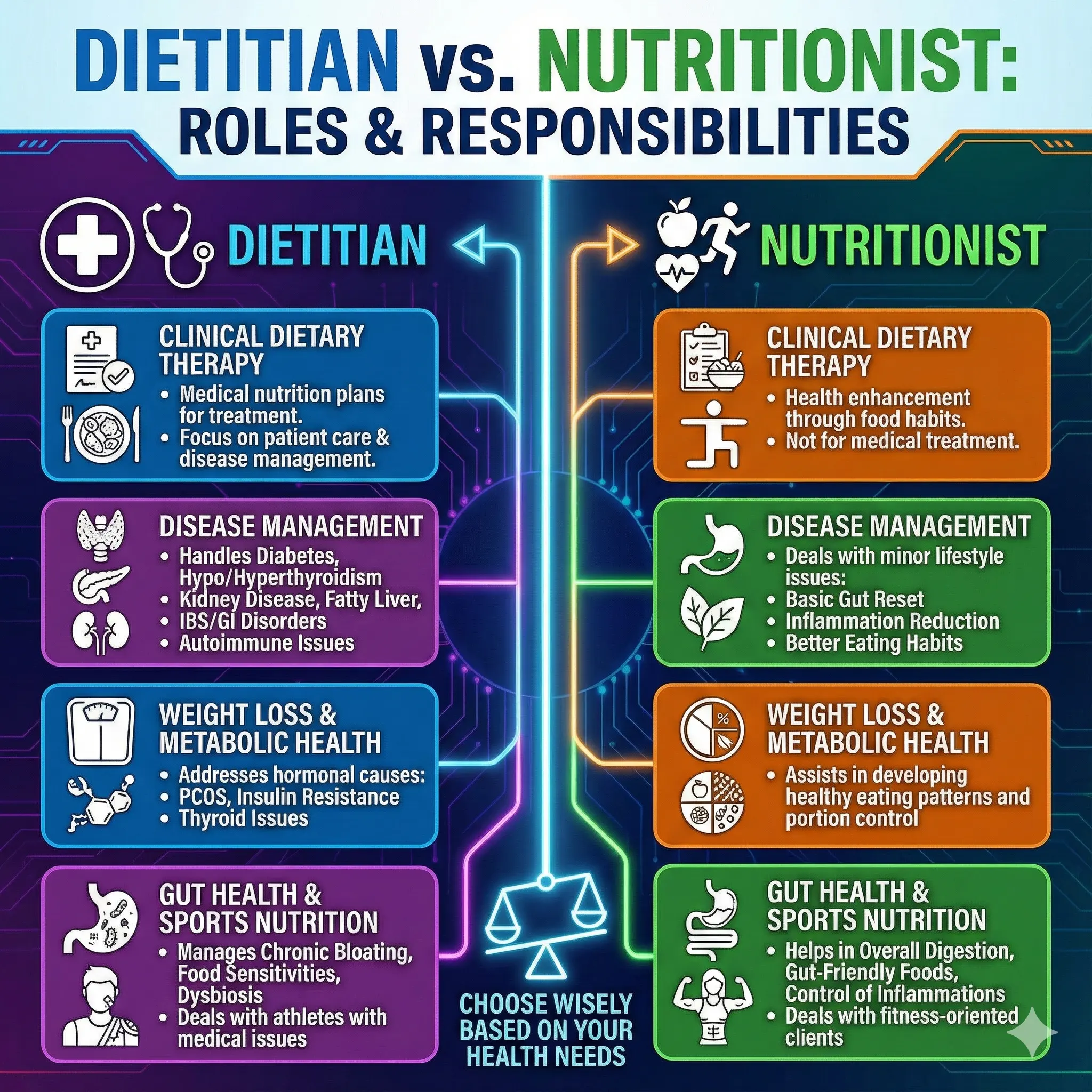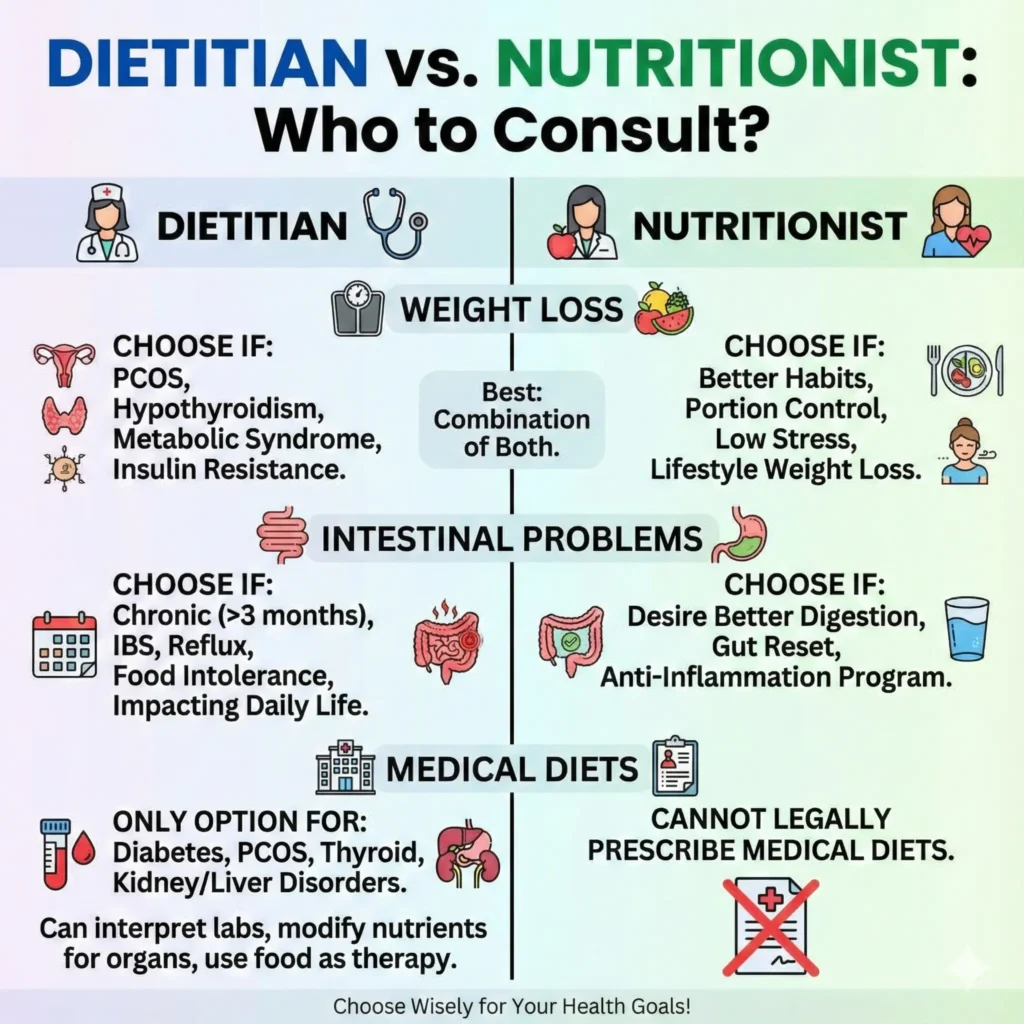If weight loss is your aim, the food that you consume before a workout is still very important. Many people think that fasting or eating less will automatically speed up fat loss. Actually, on many occasions, it turns out to be the other way round. Lack of good nutrition before exercise can make you feel tired halfway through the workout, lower the intensity of the session, and, as a result, keep your progress at a standstill.
A properly planned meal before the workout intended for weight loss does not interfere with fat burning, it helps in fat loss. When your system is provided with the correct fuel at the right time, you can work out harder, recover faster and, in total, use more calories. Here we will explain the things that are going on in your body when you consume a meal before a workout, what you should eat, what you should avoid, and how you should choose food that helps you lose fat and does not make you feel tired.
Why Pre Workout Nutrition Has a Direct Impact on Fat Loss
Fat loss is not only dependent on the number of calories you consume daily. It also depends on the energy utilization of your body during physical activities. If you do exercises without adequate fuel, the body might not be able to keep the intensity it has been doing. This, in turn, is often followed by a reduction in the time of exercise, taking more breaks, and at the same time, poor recovery that in the long run, leads to low total calorie burn.
A well-balanced meal before the workout for weight loss provides enough glycogen to the muscles for performing, and at the same time, is calorie-controlled. It stabilizes blood sugar levels, lessens the breakdown of muscles, and stops an intense feeling of hunger after the workout, which is a frequently occurring reason that people eat more than they should later in the day.
To put it simply, eating properly before the gym can help you burn more fat during the day and not only during the workout.
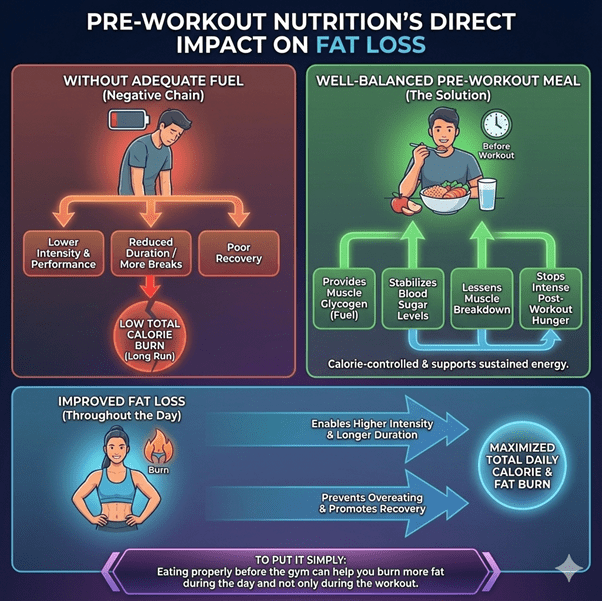
Should You Eat Before a Workout When Trying to Lose Weight?
This is the point where the misunderstanding typically arises. Some people can do fasted workouts, while others cannot. The reality is somewhere in the middle.
In case your workout is of low intensity, for example, walking or light stretching, you may find that you do not need to eat beforehand. However, if it is strength training, HIIT, or any other exercise which requires energy, then performance will most likely be lowered if you train completely on an empty stomach. Lower performance means less calories burned, weaker muscle engagement, and slower progress.
For the majority, taking a little food before a workout for weight loss is more advantageous than not eating at all. The purpose is not to feel “full” but rather to feel “able”.
How the Right Pre Workout Meal Helps Burn Fat More Efficiently
When one has consumed the right foods before doing the necessary, the body will not store that as fat right away. The nutrients will be used for the movement that requires energy. Carbohydrates are the main source of energy, while protein protects the muscles, and together they make it possible to work out at a higher intensity.
Higher intensity workouts elevate total energy expenditure and promote metabolic health. After some time, this will lead to better fat loss results than performing low-energy, under-fuelled sessions.
That is why the right pre workout meal for weight loss is less about restriction and more about strategic fueling.

Understanding What Your Body Needs Before a Workout
Before the body goes through any work, it mainly requires energy that can be easily accessed. Generally, that energy is derived from carbohydrates. Protein acts as a helper and supports the reduction of muscle breakdown and helps the recovery process that comes later.
Meanwhile, fats, though beneficial, are slow in digestion and therefore are not the best bet if taken just before a workout. Too much fat can give you a feeling of heaviness, making you slower or even causing discomfort during training.
A proper pre-workout meal is one that is easily digestible, provides energy on a steady basis, and does not divert the body’s attention from the workout.
The Importance of Carbohydrates in a Pre Workout Meal for Weight Loss
Carbohydrates are often blamed for weight loss problems, however, they are indispensable before workouts. During an exercise session, the body prefers stored carbohydrates (glycogen) to be used for energy. When glycogen levels are depleted to a great extent, then workout intensity has to be dropped.
Selection of proper carbohydrates is what matters the most. Pure and minimally processed carbs such as oats, fruits, and whole grains will keep energy at a steady level without causing blood sugar spikes. At the same time, these foods make one stay longer and harder for the fatigue to set in, and thus the principle of fat loss is observed.
Completely cutting off carbs before workouts may give you the feeling that you are effective in the short term, but you will have to face the consequences quite soon.
Why Protein Is Important Before You Go to the Gym
First of all, protein consumption before the workout does not directly lead to fat burning. However, indirectly, it plays a major role. It is a major factor in the prevention of muscle breakdown during the workout period, particularly when you are in a calorie deficit. The importance of muscle preservation is that muscle tissue works as a helper in keeping a higher metabolic rate.
Adding protein to your pre workout meal for weight loss also provides a feeling of fullness, which means there is a low possibility of overeating later in the day. Even a tiny quantity of it, for instance, whey protein, egg whites, or yogurt, can bring about a significant change.
Time Your Pre Workout Meal In The Right Way
The time when you eat is as important as what you eat. Overeating just before a workout is very likely to result in stomach distension, vomiting, and fatigue. Conversely, if you eat too early, you might find that you are hungry again before training.
In case you have 60 to 90 minutes before your workout, you may go for a slightly more complete meal with carbs and protein. If you are eating close to the time of the workout, then keeping it light and easy to digest would be the best option.
Listening to your body’s signals and maintaining a regular schedule helps you figure out what is best for you.
Pre-Workout Meals for Weight Loss That Are Actually Effective
One good pre-workout meal should be something you can easily make over and over again. You should not require complicated recipes or costly ingredients.
Some examples of balanced energy without extra calories might be: oats with protein, fruit with a protein shake, or whole grain toast with egg whites. These alternatives are performance enhancers that also keep in line with fat loss goals.
The most effective pre workout meal for weight loss is the one that you can maintain on a regular basis, not the one that seems forced or restrictive.
Morning Workouts: What Food Is Good For You?
Exercise in the early morning hours poses a problem in that digestion is slower sometimes, and most of the time, one does not have an appetite. Many people feel comfortable fasting for the time of work, particularly when it is light cardio. In any other case, a little provision can do a lot to enhance the output of the body.
Just one of the following would be perfect: a banana, a scoop of whey protein, or a cup of black coffee. These can offer sufficient energy to show good performance without a heavy feeling. The whole idea supports the loss of fat and at the same time keeps the workouts effective.
Healthy and Easy Indian Weight Loss Pre Workout Meals
Insufficient-westernization is the major problem most of the online pre-workout nutrition advice face. The reality is you do not need to have expensive smoothie bowls or import ingredients to give your body the right fuel. Traditional Indian foods can be just as good as long as you take care of the portions, timing, and preparation.
The Indian meals are usually a combination of carbohydrate, protein, and fat in one dish. In case of weight loss pre workout meal, the main point should be turning to lighter meals, cutting the oil, and refraining from heavy gravies. The main idea is to energize the body without overloading the digestive system.
Some of the best Indian pre-workout food options are:
- Green vegetable poha made with the least amount of oil
- Plain idli with a small amount of chutney and a bowl of sambar
- Moong dal chilla (small serving, less oil or butter)
- Sprouts chaat without oil and sev
- Upma prepared lightly and eaten in moderation
All these foods are fairly easy to digest, and they provide sufficient energy for workouts without making you feel heavy or lethargic.
What to Eat Before Different Types of Workouts
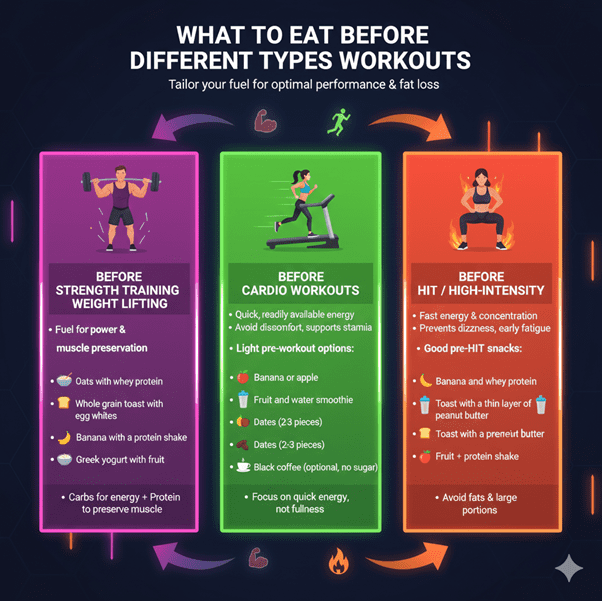
The body, however, is like a machine that needs different kinds of fuel for different kinds of tasks. The energy required for a slow walk and a heavy leg day is very different. Understanding this is key to choosing a pre-workout meal that not only supports fat loss but also gives good performance.
Before Strength Training or Weight Lifting
To power the lifting of weights as well as keep one’s form strength training calls for energy. Lack of sufficient energy makes the workouts shorter, weaker, and less productive — resulting in direct fat loss impact.
Good power-up meals for the workout of weight training are:
- Oats with whey protein
- Whole grain toast with egg whites
- Banana with a protein shake
- Greek yogurt with fruit
These meals give the body carbohydrates that it uses for energy along with protein that it uses to preserve muscle mass.
Before Cardio Workouts
Cardio usually depends on energy that is readily available and doesn’t draw much from the muscle. Heavy meals taken before cardio may cause discomfort and thus, affect breathing and stamina.
Some light pre-workout options for cardio are:
- Banana or apple
- Fruit and water smoothie
- Dates (2-3 pieces)
- Black coffee (optional, no sugar)
The main focus is on quick energy rather than fullness.
Before HIIT or High-Intensity Workouts
HIIT exercises call for energy that is fast as well as concentration. Under-fuelling during training may cause dizziness and early fatigue, leading to a decrease in calories burnt.
Good pre-HIIT snacks include:
- Banana and whey protein
- Toast with a thin layer of peanut butter
- Fruit + protein shake
Before HIIT sessions, it is advisable to avoid fats and large portions.
What Foods Should You Not Eat Before a Workout (If You Want to Lose Fat)?
Even those foods that are labeled “healthy” can be your enemies if you eat them at the wrong time. Certain foods slow the digestion process, reduce the efficiency of the workout, and make it difficult to train.
It is better to omit the following products from your pre-workout diet:
- Deep-fried snacks and heavy meals
- Foods with a lot of sugar like biscuits, pastries, or sweets
- Dense dairy products such as full-fat milk or cheese
- Large amounts of nuts or seeds
- Alcohol (even in small quantities)
By staying away from these foods, you keep your energy at a good level and eliminate the chances of digestive discomforts during your training.
Does Coffee Help Fat Burning Before Workouts?
Caffeine is one of the very few natural things that have been scientifically proven to make workout performance better. When consumed in moderation, black coffee taken just before a workout can lead to increased alertness, perception of effort being lowered, and fat being used as an energy source.
Still, coffee does not burn fat on its own. All it does is enable you to work out better, thus, fat loss is supported indirectly. Any sugar, cream, or flavored syrups that you add negate the benefits that it has.
In case you take coffee as your pre-workout fuel, do it the right way:
- Just black coffee
- No sugar or milk
- Consume it 20-30 minutes before training
Common Pre-Workout Nutrition Mistakes That Slow Weight Loss
A lot of people are not aware that they are making the same mistakes over and over which in turn are halting their progress. They are not always accountable for the immediate results, but over time they slow down fat loss and lessen the ability to keep up with workouts.
The majority of problems come from completely skipping meals, overconsuming “healthy” foods, overusing supplements, or eating very close to workout time. Another factor, which is often overlooked, is hydration, even slight dehydration can impact your performance in the gym heavily.
Usually, the reason why weight loss is being held back is not one that can be traced back to a single bad meal. It’s more often the case of small repeated nutrition mistakes that add up.
Final Thoughts
Weight loss pre-workout meal is not a matter of restriction or starving oneself. Rather, it is about supplying the body with just enough energy so that it can move well, train harder, and not give up.
Fat loss becomes much more predictable and sustainable when workouts are strong. Instead of harshly cutting foods, concentrate more on timing, balance, and being simple.
In case of any related query to healthy nutrition or weight loss book an online appointment with Dt. Silky Mahajan. Please send us an email at info@foodsandnutrition.in or call on 7829999400 between 10:00 AM IST – 7:00 PM IST (Mon – Sat). Follow us on facebook & instagram for latest updates.
FAQ
The 3-3-3 rule for weight loss is a simple, habit-based approach focusing on consistent daily actions: 3 nutrient-rich meals, 3 simple movements/exercises (like walking or bodyweight moves), and 3 things to avoid (like sugary drinks, late snacks, distracted eating), all supported by plenty of water to build sustainable habits for fat loss, not just quick fixes, emphasizing consistency over strict calorie counting.
Yes, you can eat 30 minutes before the gym, but it should be a light, easily digestible snack focused on simple carbs and a little protein, like a banana or a small bowl of oats with berries, to give quick energy without causing stomach upset. Avoid heavy fats, fiber, and large meals as they take too long to digest, which can leave you feeling sluggish or bloated during your workout.
The popular 2-2-2 Weight Loss Rule is a simple, habit-focused method encouraging two big bottles of water daily, two servings of fruits/veggies, and two short walks (e.g., 15-30 mins) each day, aiming to boost hydration, nutrient intake, and movement for easier, sustainable weight loss by creating positive momentum and supporting metabolism.
Yes, you can eat paneer before a workout, especially if paired with carbs like roti for energy, as its protein supports muscles, but it’s better for longer, sustained energy or post-workout recovery due to its fat content; for a quick pre-workout boost, focus on low-fat paneer or lighter preparations, and always time it with a carbohydrate source about 1-2 hours before training.
Bananas are generally better for quick, easily digestible energy and cramp prevention (potassium), ideal for intense workouts; apples offer slower, sustained energy due to higher fiber, better for longer sessions but might cause bloating if eaten too close to exercise, making the “better” choice depend on your workout type and timing.
The “4 8 12 rule” generally refers to a weightlifting rep scheme for muscle growth (hypertrophy), often meaning 4 sets in the 8-12 rep range for an exercise, or it can be a fitness schedule for endurance, aiming for 4+8+12 hours of different training intensities weekly.
Oats
Fresh fruits; banana, apple, orange, etc
Whole Grains, such as bread or bagels
Smoothie (made up of low-fat, moderate carbohydrates)
Trail mix (small portion)
Low-fat yogurt with toppings
Nut butter (small portion)
Protein shake
Strength training exercises are recommended at least twice a week. If you want to lose weight or meet specific fitness goals, you might need to exercise more. There is some evidence that high-intensity interval training (HIIT) can help reduce belly fat, as can strength training.
Warm water
Black coffee (no sugar, no milk)
Green tea
Lemon water
Jeera (cumin) water
Apple cider vinegar (diluted)
Ginger tea
Cinnamon water













